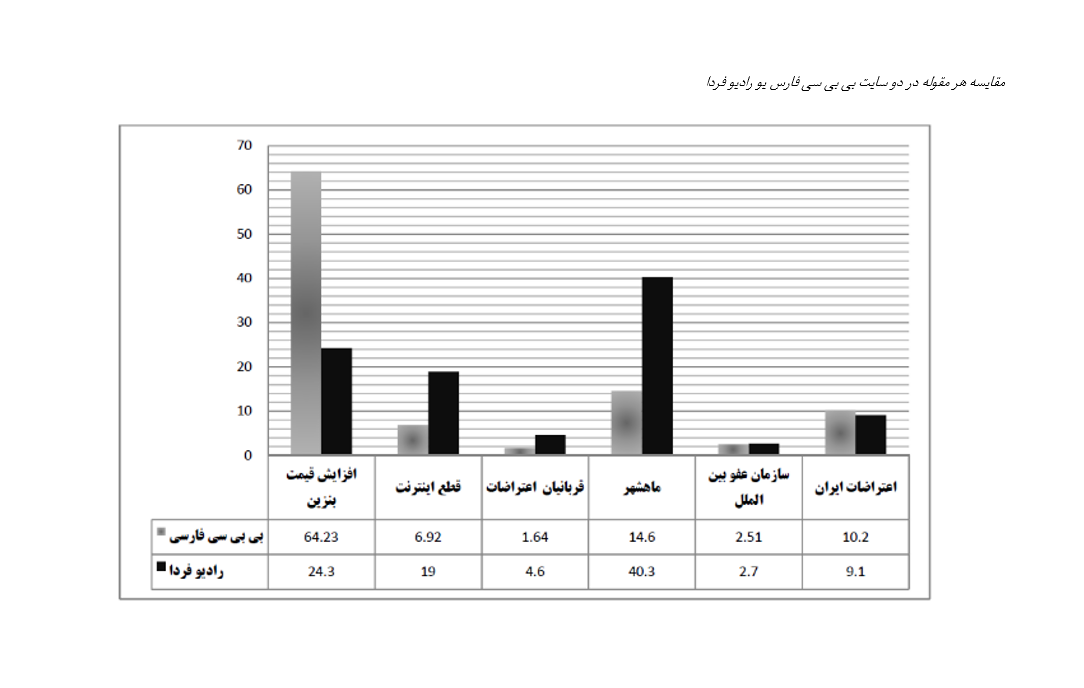الگوی تحلیل سیاست رسانهای بی بی سی و رادیو فردا با تاکید بر بحران بنزین سال 98
کلمات کلیدی:
فضای مجازی, شبکه های اجتماعی, جنگ نرم, افزایش قیمت بنزین, قربانیان اعتراضات, برجسته سازیچکیده
رمز گشایی از نحوه پوشش رسانه ای، سوژههای رقیب گفتمان انقلاب اسلامی از سوی رسانههای اپوزیسیون هدف پژوهش حاضر است. اعلام ناگهانی افزایش قیمت بنزین از 24 آبان 1398 در ایران، موجی از اعتراضات با خود به همراه داشت و همین باعث شد تا سایتهای خبری بی بی سی فارسی و رادیو فردا با هدف هجمه رسانهای به جمهوری اسلامی ایران در یک بازه زمانی 48 روزه، 744 خبر روی خروجی سایتهای خود بارگذاری نمایند. علت نقش آفرینی گسترده سایتهای خبری بی بی سی فارسی و رادیو فردا برای پوشش لحظهای اعتراضات به افزایش قیمت بنزین در ایران سئوال اصلی پژوهش است و برای دستیابی به هدف پژوهش از روش تحلیل محتوا بهره گرفته شده است. اتخاذ راهبرد برجسته سازی چالشها در ایران به منظور فاصله گرفتن مردم از حاکمیت در بلند مدت فرضیه اصلی تحقیق است. نتایج نشان میدهد این سایتهای خبری پس از شناسایی چالشهای جامعه ایرانی با استفاده از تکنیکهای جریان سازی و برجسته سازی اقدام به بزرگنمایی نامتعارف حوادث در ایران میکنند.
دانلودها
مراجع
Badiei, N. (1998). Content Analysis of Articles in 10 Tehran Newspapers. Media(9).
Bagheri-Hoshi, M., Javidkar, M., & Aqa-Mohammad, M. (2013). The Role of Persian-Language Satellite Channels in Advancing U.S. Objectives in the Islamic Republic of Iran (Case Study: Radio Farda). Media and Culture, 29-58.
Dearing, J., & Rogers, E. (2006). Media Agenda-Setting Foundations. Cooperative Organization of Main Departments.
Forghani, M.-M., & Taqavipur, M.-R. (2019). From Discourse-Making to Agenda-Setting by BBC Persian on Human Rights Cases. Quarterly of Communication Research, 26(97), 77-110.
Iranianpour-Nozari, E. (2009). Highlighting. Ketab Mah Social Sciences(23), 82-91.
Majidi, H., & Nourizadeh, J. (2011). BBC Persian Television and Representation of Iran's Internal Developments in 2009. Culture-Communication Studies, 189-223.
Naderloo, Y. (2007). Analysis of News Arrangement in Islamic Republic of Iran Broadcasting (IRIB) Tehran Broadcasting University].

دانلود
چاپ شده
ارسال
بازنگری
پذیرش
شماره
نوع مقاله
مجوز
حق نشر 2025 Ali Zakeri (Author); Masoud Motalebi (Corresponding Author); Abdolreza Bay (Author)

این پروژه تحت مجوز بین المللی Creative Commons Attribution-NonCommercial 4.0 می باشد.







